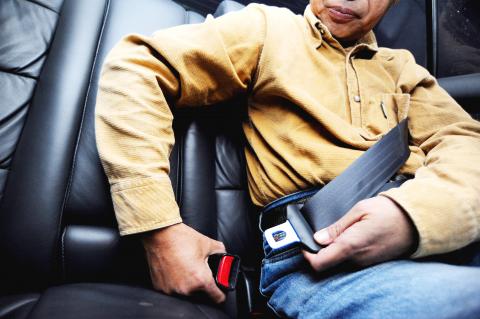Backseat passengers in sedans could soon be required to wear seatbelts after the Ministry of Transportation and Communications yesterday said it had completed an amendment to the Act Governing the Punishment of Violation of Road Traffic Regulations (道路交通管理處罰條例) last week.
The proposed amendment says that those who fail to abide by the new traffic regulations would be fined NT$1,500 when driving on regular roads or between NT$3,000 and NT$6,000 when driving on freeways or expressways.
-The ministry’s Department of Highways and Railways -director-general, Chen Yen-po (陳彥伯), said the amendment would be sent to the Executive Yuan for approval. If it is approved, it will be forwarded to the legislature for review.

Photo: Lo Pei-der, Taipei Times
According to Chen, the ministry will execute the regulation in two stages once the amendment is passed.
Adults will first be required to wear seatbelts when sitting in the back once the ministry has spent one to three months informing the public about the change.
Since 2004, the ministry has required parents to install child safety seats when traveling with children under the age of four. The new amendment sets regulations on children who are above the age of four.
Chen said that parents with children who are between four and 12 years of age or between 18kg and 36kg will need to install booster seats as well. They are only exempt from following this rule if regular seatbelts fit the children perfectly.
“If seatbelts are placed too close to the children’s necks or heads, then parents will need booster [seats] in their cars,” he said.
Booster seat specifications must follow CNS11497 standards issued by the Bureau of Standards, Metrology and Inspection, he said.
Chen said the ministry will spend six months to one year promoting the requirements for child passengers in cars.
The issue of backseat seatbelts has been under the media spotlight since Nora Sun (孫穗芬), a granddaughter of Republic of China (ROC) founding father Sun Yat-sen (孫逸仙), was severely injured in a car accident earlier this month.
Former Democratic Progressive Party (DPP) Legislator Chen Chao-lung (陳朝龍) first proposed the amendment to Article 31 in 2006 after Shaw Hsiao-ling (邵曉鈴), the wife of Jason Hu, who was campaigning for re-election as Taichung mayor at the time, was critically injured in a car crash on a freeway near Tainan.
The amendment was passed at its third reading in the legislature, but it was dropped after other legislators proposed reconsidering the bill.

Taiwanese can file complaints with the Tourism Administration to report travel agencies if their activities caused termination of a person’s citizenship, Mainland Affairs Council Minister Chiu Chui-cheng (邱垂正) said yesterday, after a podcaster highlighted a case in which a person’s citizenship was canceled for receiving a single-use Chinese passport to enter Russia. The council is aware of incidents in which people who signed up through Chinese travel agencies for tours of Russia were told they could obtain Russian visas and fast-track border clearance, Chiu told reporters on the sidelines of an event in Taipei. However, the travel agencies actually applied

New measures aimed at making Taiwan more attractive to foreign professionals came into effect this month, the National Development Council said yesterday. Among the changes, international students at Taiwanese universities would be able to work in Taiwan without a work permit in the two years after they graduate, explainer materials provided by the council said. In addition, foreign nationals who graduated from one of the world’s top 200 universities within the past five years can also apply for a two-year open work permit. Previously, those graduates would have needed to apply for a work permit using point-based criteria or have a Taiwanese company

The Shilin District Prosecutors’ Office yesterday indicted two Taiwanese and issued a wanted notice for Pete Liu (劉作虎), founder of Shenzhen-based smartphone manufacturer OnePlus Technology Co (萬普拉斯科技), for allegedly contravening the Act Governing Relations Between the People of the Taiwan Area and the Mainland Area (臺灣地區與大陸地區人民關係條例) by poaching 70 engineers in Taiwan. Liu allegedly traveled to Taiwan at the end of 2014 and met with a Taiwanese man surnamed Lin (林) to discuss establishing a mobile software research and development (R&D) team in Taiwan, prosecutors said. Without approval from the government, Lin, following Liu’s instructions, recruited more than 70 software

Chinese spouse and influencer Guan Guan’s (關關) residency permit has been revoked for repeatedly posting pro-China videos that threaten national security, the National Immigration Agency confirmed today. Guan Guan has said many controversial statements in her videos posted to Douyin (抖音), including “the red flag will soon be painted all over Taiwan” and “Taiwan is an inseparable part of China,” and expressing hope for expedited reunification. The agency last year received multiple reports alleging that Guan Guan had advocated for armed reunification. After verifying the reports, the agency last month issued a notice requiring her to appear and explain her actions. Guan